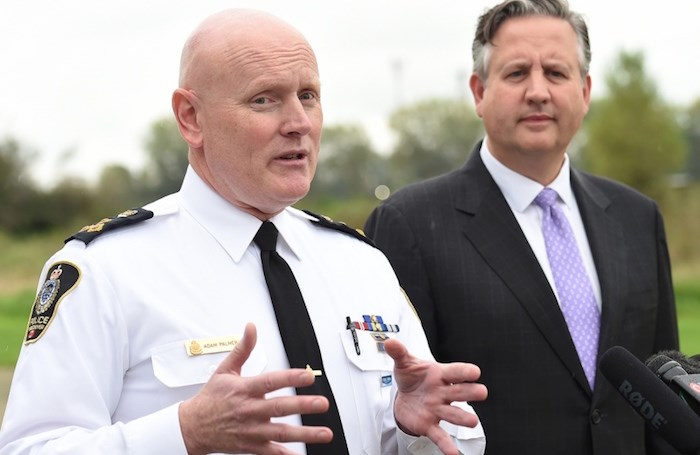 Police Chief Adam Palmer outlined his department’s case to council Tuesday for the need to hire more officers. Photo Dan Toulgoet
Police Chief Adam Palmer outlined his department’s case to council Tuesday for the need to hire more officers. Photo Dan Toulgoet
Police Chief Adam Palmer made his pitch to Vancouver city council Tuesday for the need to spend $2.3 million to hire 25 new officers and 10 civilian staff.
Palmer said an increase in the city’s population and wider region has led to an increase in calls — more than 1,100 per day — and placed a lot of stress on the current complement of officers.
He pointed out city-imposed budget restraints saw the department operate with 58 fewer officers and 27 fewer civilian staff in 2017 than in 2009.
“Working with fewer officers than we had years ago is a huge drain on people,” the chief said.
“At some point, people reach the breaking point, and we saw it through stress on frontline officers…it really does impact our employee wellness when you’re just running people ragged every single day.”
Palmer was among several city department managers, including the fire chief and parks board general manager, who made their pitch to council regarding budget needs for 2020.
The police department’s proposed 2020 budget is $315,278,281, an increase of 4.6 per cent, or $13,782,426 over the 2019 budget.
The police budget, as it does every year, represents the biggest single percentage of the city’s operating budget, which is $1.6 billion for 2020. The police portion is about 21 per cent.
In 2010, the police’s budget was $189 million, more than $100 million less than what’s being proposed for 2020.
The significant increase was expected to be addressed — after the Courier’s deadline — at council Tuesday by representatives of the Vancouver Area Network of Drug Users, the Pivot Legal Society and the Carnegie Community Action Project.
The organizations have previously opposed increased police spending for such initiatives as a drug containment facility and new community policing centre in Strathcona. They argued money would be better spent combatting the opioid crisis.
More than 50 people had signed up Tuesday to speak to council about the budget, which is expected to be approved at council’s Dec. 10 meeting.
As previous police board-set budgets have shown, increases to salaries, benefits, replacing old vehicles and adding new equipment were factors in increased costs to the police budget over the decade.
The department’s most recent request to hire new officers and staff is connected to a decision made by the previous council in 2017.
That’s when council approved recommendations of the VPD’s operational review that called for an increase of 120 officers, 52 civilian staff and related resources over five years.
Now in year three of that approved plan, the VPD wants an increase of 25 officers, 10 civilian staff and related resources. The cost is estimated at $2.3 million.
The remaining increases in the police budget for 2020 are largely for salaries and benefits, equipment, vehicles, DNA services and community policing centres.
If the 25 new officers are hired, 16 would work in patrol in the north half of the city. The others would be assigned to investigations involving child abuse, domestic violence and Internet exploitation.
The VPD’s proposed budget for 2020 is one of many to come that require increases. A VPD budget report says the department’s budget is expected to increase by an average of 3.2 per cent from 2021 to 2024.
“Investigative standards will continue to evolve, placing significant demand on policing resources,” the report said of the anticipated costs.
“Additionally, increasing disclosure requirements have increased the amount of time required to conclude files that must be submitted within a restricted time frame. This includes the time required to prepare documents required by Crown counsel.”
The report goes on to mention how changes to the Criminal Code of Canada, decisions by other levels of government, courts, coroners’ inquests and commissions of inquiry can affect how the VPD uses its resources.
Negotiated or arbitrated settlements, exempt wage increases and fringe benefit costs for existing staff are other anticipated costs to future budgets.
“Additionally, global trends and events such as the worldwide extremist threat level, highly technical cybercrime, new illicit drugs, urban issues such as the Downtown Eastside, as well as a web of international organized crime and gang activities continue to necessitate additional resources, as well as increasing deployments for large events, protests and demonstrations,” the report said.
The city’s draft budget calls for an 8.2 per cent property tax increase, one that OneCity Coun. Christine Boyle has defended and NPA Coun. Rebecca Bligh has opposed.
Both councillors took to Twitter recently to express their views.
Boyle: “Vancouver’s property taxes are low, and annual increases have been held to a minimum for years. That may sound great, but there’s a cost to us all over time: less investment in basic infrastructure, eroded services and a reduced capacity to fund the things this moment demands of us.”
Bligh: “The proposed property tax increase of 8.2 per cent by the City of Vancouver is OUTRAGEOUS. It is the largest in a decade and must be reduced.”



